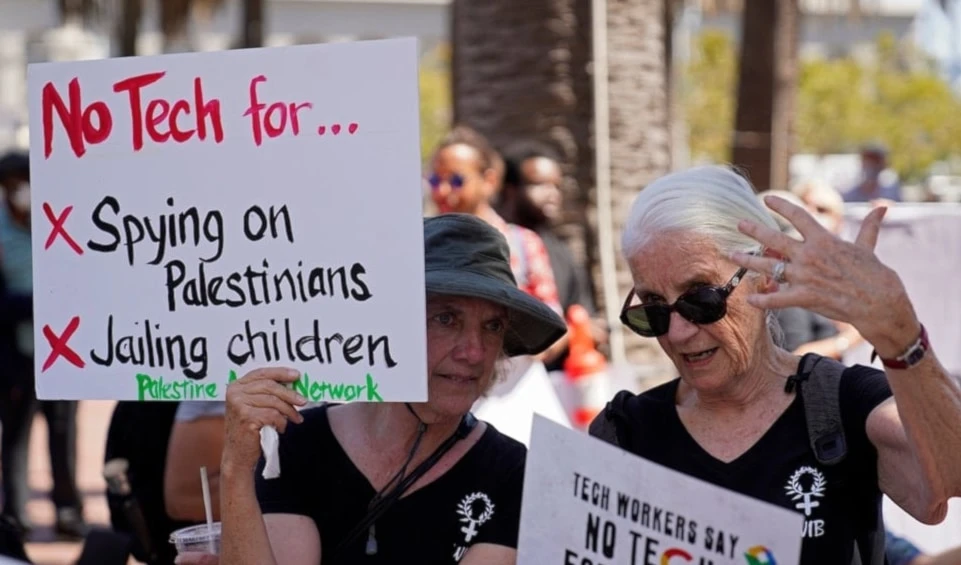Trump pushing AI chip deals in Saudi, UAE trip
Trump aims to finalize major AI chip and mining deals with Saudi Arabia and the UAE, deepening tech ties to counter China’s growing influence.
-

US President Donald Trump and Saudi Crown Prince Mohammed bin Salman greet delegations during an arrival ceremony at the Royal Palace in Riyadh, Saudi Arabia, May 13, 2025 (AP/Alex Brandon)
The Trump administration is preparing to finalize major technology and resource agreements during US President Donald Trump’s trip to the Middle East, including the US export of vast quantities of artificial intelligence chips and the approval of a Saudi mining company tasked with supplying critical minerals to the US, according to The Washington Post.
The deals aim to strengthen regional ties while positioning Saudi Arabia and the United Arab Emirates as emerging AI powerhouses aligned with Washington’s strategic goals.
According to WaPo, sources familiar with the negotiations said the US intends to authorize the sale of hundreds of thousands of advanced AI chips to G42, the UAE’s state-linked AI firm, and Humain, a newly formed Saudi company.
We are excited to announce a $1.5 billion investment from @Microsoft in G42, marking a significant step forward in our journey to lead in #AI innovation globally. pic.twitter.com/XJ0Q4WiZta
— G42 (@G42ai) April 16, 2024
The chips are expected to flow both through a new partnership between G42 and OpenAI and directly to G42 itself.
G42, Humain to gain access to US-made chips
While the Biden administration had slowed exports of such technologies due to concerns over regional ties with China, the Trump administration is now accelerating access. This marks a notable departure in US foreign policy, which had emphasized tighter controls and phased auditing of AI data centers in both countries.
The move would allow both G42 and Humain to expand their AI infrastructure rapidly, with G42 expected to deepen its collaboration with OpenAI. Key figures such as OpenAI CEO Sam Altman, Trump’s AI czar David Sacks, Cerebras Systems CEO Andrew Feldman, and billionaire Trump advisor Elon Musk are currently in the region for talks.
In parallel, the Trump administration has endorsed a $9 billion memorandum of understanding between a US investment firm and Saudi partners to explore and export critical minerals, including lithium, cobalt, and rare earth elements.
Shahal Khan, founder of Burkhan World Investments, confirmed that Saudi Arabia’s Grand Mines Mining LLC will carry out prospecting operations within the kingdom and in Africa, with the minerals destined for US supply chains.
Documents reviewed by The Washington Post outline the strategic goal of supporting US manufacturing, defense, and energy sectors with reliable access to these essential inputs.
Strategic shift draws criticism over tech dependence
The acceleration of AI chip exports represents a sharp break from earlier policies intended to limit the proliferation of US computing power to governments with ties to China and Russia. Critics argue that the move could inadvertently recreate a dependency similar to that seen with oil, only now in the realm of critical technology.
Sam Winter-Levy of the Carnegie Endowment for International Peace noted that this shift risks undermining long-term US leverage. “We essentially spent the last half-century trying to reduce the leverage of these states over the US because of their control of the oil supply.
Why would we recreate that dependency?” he asked. “You are offshoring a core strategic technology, computing power, while creating new sources of dependence on authoritarian regimes with close ties to the Chinese and the Russians.”
6/ A smart deal would allow U.S. tech companies to build some datacenters in partnership with local orgs, but bar offshoring of their most sophisticated ops. In return, the Gulf should cut off investment in China’s AI and semiconductor sectors and safeguard exported U.S. tech
— Sam Winter-Levy (@SamWinterLevy) May 8, 2025
Key tech executives join Trump in regional talks
Trump’s administration has played a key role in brokering large investments from Gulf countries into US data center infrastructure. The region’s energy wealth and abundant power capacity have made it a key partner for Silicon Valley firms seeking to expand AI operations.
Winter-Levy, while supportive of AI technology export in principle, criticized the administration’s approach. “This is an administration that prides itself on using US leverage to the max and driving a hard bargain, but this deal seems to be shaping up to be a giveaway of a core strategic technology in exchange for pretty short-term and superficial concessions,” he said.
As talks continue, observers will be watching whether the push for rapid tech integration in the Gulf leads to new geopolitical leverage, or long-term strategic vulnerabilities, WaPo remarked.

 4 Min Read
4 Min Read










